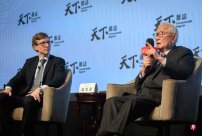In response to the U.S. Department of Commerce's upgrade of export control measures in China, the China International Trade Promotion Commission said on Thursday (October 27) that this approach violated the original intention of the international traffic system of export control and suspected of violating the World Trade Organization and the non -non -WTOPrinciples discrimination.
According to CCTV News, a spokesman for the China Trade Councilor Sun Xiao said at a routine press conference on Thursday that the United States included 31 Chinese entities on the "unattended list" and upgraded China semiconductor export controlIt not only increases the control items, but also expands the final use export control involving supercomputers and semiconductor production.
He said that this approach completely departed from the original intention of export control. It was suspected of violating the principle of non -discrimination of the WTO, which seriously affected the security and stability of the global industrial chain supply chain.The China Trade Promotion Association has resolutely opposed this and called on enterprises in various countries to maintain mutual trust and friendly cooperation spirit to jointly respond to the adverse effects of unilateral practices in the United States.
The U.S. Department of Commerce announced on October 7 that the US export management regulations were announced, and the export control measures to China have been upgraded.People of the United States are working on China's semiconductor industry.On the same day, the US Department of Commerce included 31 Chinese entities in the export control "unprepared list."
In addition, the US government recently issued a 2022 inflation reduction bill.According to the bill, the U.S. government will provide investment and tax claims of up to $ 369 billion (S $ 518.9 billion) for clean energy.At the same time, the bill also stipulates that it can only provide tax credits to the purchase and manufacturing electric vehicles that purchase the United States and sign a free trade agreement with it.
In this regard, Sun Xiao said that this is a typical trade protectionist practice. It is an inappropriate intervention in global electric vehicle supply chain and industrial chain, which seriously affects the free competition of the global electric vehicle industry.He said that the electric vehicle subsidies under the bill put forward unreasonable requirements for local procurement and local production, and were suspected of violating the principles of non -discrimination such as the WTO's most benefited nations and non -discrimination of national treatment.The China Trade Promotion Council resolutely opposes this trade protectionism, and will continue to track and evaluate the impact of the implementation of the law on the relevant industries and enterprises in China, helping enterprises to safeguard their legitimate rights and interests and legitimate interests.


